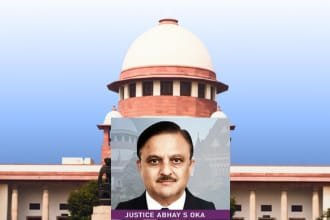In a significant development with potential implications for judicial transparency and fairness, the Supreme Court of India on May 9, 2025, issued notice to the Allahabad High Court over its 2019 Senior Advocate designations, raising serious concerns over deviations from the landmark Indira Jaising guidelines laid down in 2017.
A Bench of Justices Abhay S Oka and Ujjal Bhuyan observed that the Allahabad High Court’s Permanent Committee had arbitrarily modified the points-based assessment system without adherence to the framework set out by the apex court in Indira Jaising v. Supreme Court of India, resulting in potential injustice to deserving advocates.
Background: The 2019 Designations Under Scrutiny
The case reached the Supreme Court via a petition filed by advocate Vishnu Bihari Tiwari, who challenged the September 2024 judgment of the Allahabad High Court upholding its 2019 Senior designations.
According to the petitioner, the Permanent Committee of the High Court had altered the 100-point evaluation criteria laid down by the Supreme Court, and instead shortlisted candidates based on a cut-off of 45 out of 75 points—a clear deviation from the standard framework.
The Allahabad High Court had rejected Tiwari’s plea, holding that since no designations had occurred after 2019, and as the petitioner himself was not shortlisted, he lacked the locus standi to challenge the appointments.
Supreme Court’s Objection: Deviation from Indira Jaising Case
The Supreme Court Bench took exception to this rationale and observed:
“The High Court in its own wisdom has modified Indira Jaising.”
The *Indira Jaising guidelines, issued in 2017 by a Constitution Bench of the Supreme Court, established a transparent and standardized process for the designation of Senior Advocates across High Courts and the Supreme Court. It introduced a 100-point scale based on measurable criteria including publications, number of reported judgments, and professional experience.
The apex court emphasized that any modification or dilution of this framework by High Courts must be reasoned and justified, not arbitrary or opaque.
In this case, the Allahabad High Court’s Permanent Committee reportedly adopted a 75-point scale and advanced 78 names to the Full Court, out of which 75 were conferred the Senior Advocate designation, raising concerns about fairness and transparency.
Key Issues Raised Before the Supreme Court
- Violation of the 100-Point Framework: The petitioner argued that reducing the evaluation scale to 75 points without judicial reasoning or public notification contravened the Indira Jaising judgment.
- Lack of Interviews: Another major contention was the High Court’s discretionary approach to interviews. While the Indira Jaising judgment allowed for interviews, it was generally understood that such an evaluation should be uniform and not selectively applied.
- Limited Locus Standi Interpretation: The Allahabad High Court held that only those who were shortlisted but not designated could challenge the process. However, the Supreme Court appeared to take a broader view, implicitly accepting that irregularities in the process affect all applicants, even those who were not shortlisted.
- Transparency and Accountability: The opacity of the Permanent Committee’s decision-making process was questioned. The absence of a clear record justifying the reduction of the maximum marks created concerns about institutional accountability.
Delhi High Court Precedent: Pattern of Irregularities?
During the hearing, the Supreme Court Bench also referred to a similar controversy involving the Delhi High Court, where issues had arisen in the November 2024 designation process. In that matter, the same Bench had directed reconsideration of rejected and deferred candidates, showing its consistent stand on ensuring fairness in Senior Advocate appointments.
The fact that multiple High Courts are now facing scrutiny over deviation from the Indira Jaising norms suggests a pattern that could undermine the credibility of the Senior designation process, which is seen as a recognition of exceptional legal acumen and standing.
The Indira Jaising Guidelines: A Landmark for Judicial Reforms
The Indira Jaising judgment marked a watershed moment in judicial reforms by prescribing:
- A Permanent Committee headed by the Chief Justice and comprising senior judges and the Advocate General.
- A 100-point evaluation system including peer review, number of cases argued, published works, and integrity.
- Provision for interviews and public disclosure of criteria and marks.
- A process for review and feedback.
These guidelines aimed to eliminate subjective favoritism, ensuring that designations are granted on merit and transparency rather than internal lobbying or seniority alone.
Implications of Supreme Court’s Intervention
The Supreme Court’s decision to issue notice signals that judicial self-regulation must still adhere to constitutional principles of fairness, transparency, and reasonableness. It also raises the possibility of a uniform review of Senior designations across multiple High Courts if systemic deviations from the Indira Jaising guidelines are confirmed.
Further, this case may reignite discussions on whether:
- National-level oversight is needed for designations.
- A time-bound process should be introduced for periodic review of designations.
- Public participation or scrutiny could play a role in promoting transparency.
Broader Challenge to the Indira Jaising Guidelines Pending
It is also pertinent to note that the same Bench of Justices Oka and Bhuyan has reserved judgment in a broader challenge to the Indira Jaising guidelines themselves. The outcome of that case could redefine the contours of how Senior Advocates are designated and whether the current framework requires refinement or reinforcement.
Conclusion
The Supreme Court’s intervention in the 2019 Senior Advocate designations made by the Allahabad High Court is a critical reminder that transparency in judicial appointments is as important as in other organs of governance. The apex court’s remarks reaffirm the sanctity of its own precedents and underline the necessity of adhering to a uniform, merit-based process.
With the next hearing awaited and a broader challenge to the guidelines pending, the legal fraternity watches closely as India’s top court continues its push for judicial accountability and institutional integrity.



